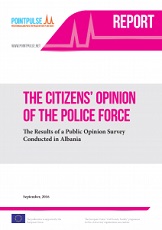2017 THE CITIZENS’ OPINION OF THE POLICE FORCE - Results of the Public Opinion Survey Conducted in Albania
2017 THE CITIZENS’ OPINION OF THE POLICE FORCE - Results of the Public Opinion Survey Conducted in Albania
Author(s): Redion Qirjazi
Subject(s): Politics / Political Sciences, Politics, Civil Society, Security and defense
Published by: BCBP Beogradski centar za bezbednosnu politiku
Keywords: police force; Albania; police sector; public opinion
Summary/Abstract: The police force is the most trusted institution in Albania. Almost two-thirds (61%) of the population says that they trust it. However, most of the Albanian institutions that have been selected for this public opinion survey lack the trust of the public. On average, in 2017, 46% of the Albanians trusted their institutions, in comparison with 44% in 2016. Results on the citizens’ perception of the police vary in accordance with age, gender and geographic location. Women show a greater level of trust in the police than men (63% and 59% respectively). People in cities trust the police less than those living in rural areas. People over 45 years of age trust the police the most, as well as less educated respondents. Policewomen are perceived as kind and decent (25%), followed by being correct on the job (17%) and friendly and helpful (16%), while male officers are seen as capable and efficient (17%), strong and powerful (13%), and serious and responsible (9%). The 2017 survey indicates that 66% of the citizens believe that police recruitment is conducted through public competitions, compared to 56% who thought the same in 2016. This positive trend indicates increased confidence in fairness and professionalism when employing police officers. Furthermore, in 2017, 66% of the respondents believe that the police are operating as a service to the Albanian citizens, in comparison with 55% that thought the same in 2016. Yet, the vast majority (69%) believe that politicians influence the operational work of the police, although this number is still lower than that of 2016 (79%). Just over half of the population (52%) believes that corruption in the police force is widespread, in comparison with last year’s 62%. On average, the perception of police corruption has remained at similar levels across genders, age groups and geographic regions. Perception of corruption within police units has also decreased since 2016, from 51% to 45%. The most corrupt police units are the Minister’s closest associates, with 52%, followed by the border police (49%). Traffic police has achieved excellent results in reducing the perception of corruption, from 63% - which made it the most corrupt unit in the eyes of the population 2016 - to 43% in 2017. Citizens are more likely to report a case of police corruption in 2017 (54%) than they were in 2016 (47%). This number would be higher if citizens’ identities were to be kept confidential. Male citizens between the ages of 18 and 29 are more likely to report a case of police corruption. As in 2016, the first choice for reporting police corruption is the local police station, followed by the media. Most Albanians believe that strict punishment for offenders and police managers is the key to preventing police corruption. Furthermore, 31% believe that the Government should lead the fight against police corruption, followed by the Minister of Interior with 16%. These data resonate closely with the previous year. When we compare the results with those from 2016, it seems that this year Albanians are placing greater emphasis on the ‘advisory’ and capacity-building roles of NGOs rather than their taking active part in fighting corruption.
Series: BCBP - Assessment of Police Integrity
- Page Count: 26
- Publication Year: 2017
- Language: English
- Content File-PDF

